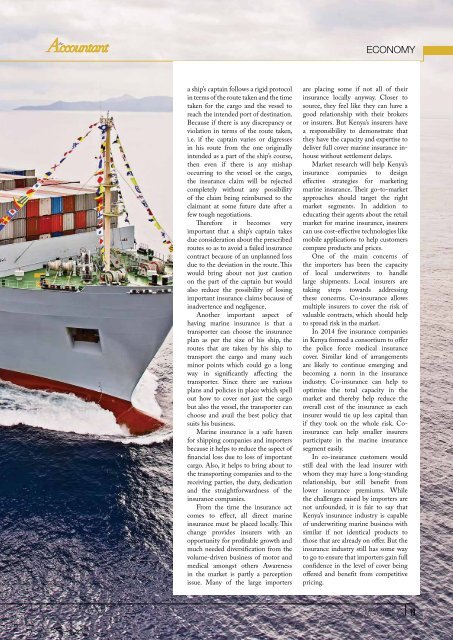The-Accountant-Jul-Aug-2017
Create successful ePaper yourself
Turn your PDF publications into a flip-book with our unique Google optimized e-Paper software.
Economy<br />
a ship’s captain follows a rigid protocol<br />
in terms of the route taken and the time<br />
taken for the cargo and the vessel to<br />
reach the intended port of destination.<br />
Because if there is any discrepancy or<br />
violation in terms of the route taken,<br />
i.e. if the captain varies or digresses<br />
in his route from the one originally<br />
intended as a part of the ship’s course,<br />
then even if there is any mishap<br />
occurring to the vessel or the cargo,<br />
the insurance claim will be rejected<br />
completely without any possibility<br />
of the claim being reimbursed to the<br />
claimant at some future date after a<br />
few tough negotiations.<br />
<strong>The</strong>refore it becomes very<br />
important that a ship’s captain takes<br />
due consideration about the prescribed<br />
routes so as to avoid a failed insurance<br />
contract because of an unplanned loss<br />
due to the deviation in the route. This<br />
would bring about not just caution<br />
on the part of the captain but would<br />
also reduce the possibility of losing<br />
important insurance claims because of<br />
inadvertence and negligence.<br />
Another important aspect of<br />
having marine insurance is that a<br />
transporter can choose the insurance<br />
plan as per the size of his ship, the<br />
routes that are taken by his ship to<br />
transport the cargo and many such<br />
minor points which could go a long<br />
way in significantly affecting the<br />
transporter. Since there are various<br />
plans and policies in place which spell<br />
out how to cover not just the cargo<br />
but also the vessel, the transporter can<br />
choose and avail the best policy that<br />
suits his business.<br />
Marine insurance is a safe haven<br />
for shipping companies and importers<br />
because it helps to reduce the aspect of<br />
financial loss due to loss of important<br />
cargo. Also, it helps to bring about to<br />
the transporting companies and to the<br />
receiving parties, the duty, dedication<br />
and the straightforwardness of the<br />
insurance companies.<br />
From the time the insurance act<br />
comes to effect, all direct marine<br />
insurance must be placed locally. This<br />
change provides insurers with an<br />
opportunity for profitable growth and<br />
much needed diversification from the<br />
volume-driven business of motor and<br />
medical amongst others Awareness<br />
in the market is partly a perception<br />
issue. Many of the large importers<br />
are placing some if not all of their<br />
insurance locally anyway. Closer to<br />
source, they feel like they can have a<br />
good relationship with their brokers<br />
or insurers. But Kenya’s insurers have<br />
a responsibility to demonstrate that<br />
they have the capacity and expertise to<br />
deliver full cover marine insurance inhouse<br />
without settlement delays.<br />
Market research will help Kenya’s<br />
insurance companies to design<br />
effective strategies for marketing<br />
marine insurance. <strong>The</strong>ir go-to-market<br />
approaches should target the right<br />
market segments. In addition to<br />
educating their agents about the retail<br />
market for marine insurance, insurers<br />
can use cost-effective technologies like<br />
mobile applications to help customers<br />
compare products and prices.<br />
One of the main concerns of<br />
the importers has been the capacity<br />
of local underwriters to handle<br />
large shipments. Local insurers are<br />
taking steps towards addressing<br />
these concerns. Co-insurance allows<br />
multiple insurers to cover the risk of<br />
valuable contracts, which should help<br />
to spread risk in the market.<br />
In 2014 five insurance companies<br />
in Kenya formed a consortium to offer<br />
the police force medical insurance<br />
cover. Similar kind of arrangements<br />
are likely to continue emerging and<br />
becoming a norm in the insurance<br />
industry. Co-insurance can help to<br />
optimise the total capacity in the<br />
market and thereby help reduce the<br />
overall cost of the insurance as each<br />
insurer would tie up less capital than<br />
if they took on the whole risk. Coinsurance<br />
can help smaller insurers<br />
participate in the marine insurance<br />
segment easily.<br />
In co-insurance customers would<br />
still deal with the lead insurer with<br />
whom they may have a long-standing<br />
relationship, but still benefit from<br />
lower insurance premiums. While<br />
the challenges raised by importers are<br />
not unfounded, it is fair to say that<br />
Kenya’s insurance industry is capable<br />
of underwriting marine business with<br />
similar if not identical products to<br />
those that are already on offer. But the<br />
insurance industry still has some way<br />
to go to ensure that importers gain full<br />
confidence in the level of cover being<br />
offered and benefit from competitive<br />
pricing.<br />
JULY - AUGUST <strong>2017</strong> 19

















